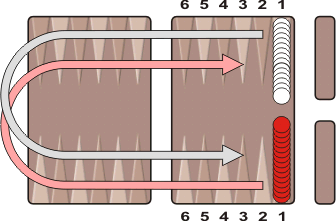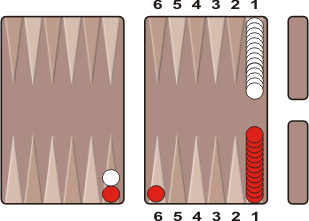![[Backgammon Galore!]](/gif/GaloreButton.gif)
|
|
Backgammon Variants Setup: Each player starts with fifteen checkers on the opponent's one-point. The checkers move around the board in opposite directions as shown in the diagram below.
Object: The object of the game is to bring all your checkers around to your own home board and then bear them off. The first player to bear off all of his checkers wins the game. To start: Each player rolls one die and the higher number goes first. That player then rolls the dice again to begin his first turn. After the first game, the winner of the previous game goes first. Movement: The roll of the dice indicates how many points, or pips, the player is to move his checkers. The following rules apply:
Pinning the opponent: There is no hitting in this game. Instead, if you land on a point occupied by a single opposing checker, the opponent's checker is trapped until you remove your checker. Two of your checkers on a point, or one of your checkers pinning the opponent's checker creates a block which the opponent cannot land or touch down on.
Bearing Off: Once you have moved all fifteen of your checkers into your home board, you may begin bearing off. You bear off rolling a number that corresponds to the point on which the checker resides, and then removing that checker from the board. If there is no checker on the point indicated by the roll, then you must make a legal move using a checker on a higher-numbered point. If there are no checkers on higher-numbered points, you must remove a checker from the highest point that has a checker. Scoring: The first player to bear off all fifteen checkers wins the game. If the losing player has borne off at least one checker, he loses only one point; otherwise he loses two points ("mars"). There is no doubling in this game.
References
|
![]()
Backgammon Galore : Variants


